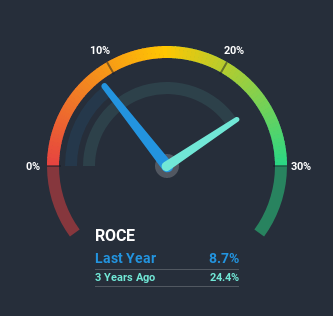Should You Be Impressed By Waterbase's (NSE:WATERBASE) Returns on Capital?

If we want to find a stock that could multiply over the long term, what are the underlying trends we should look for? Firstly, we'll want to see a proven return on capital employed (ROCE) that is increasing, and secondly, an expanding base of capital employed. Put simply, these types of businesses are compounding machines, meaning they are continually reinvesting their earnings at ever-higher rates of return. In light of that, when we looked at Waterbase (NSE:WATERBASE) and its ROCE trend, we weren't exactly thrilled.
Return On Capital Employed (ROCE): What is it?
Just to clarify if you're unsure, ROCE is a metric for evaluating how much pre-tax income (in percentage terms) a company earns on the capital invested in its business. To calculate this metric for Waterbase, this is the formula:
Return on Capital Employed = Earnings Before Interest and Tax (EBIT) ÷ (Total Assets - Current Liabilities)
0.087 = ₹168m ÷ (₹2.4b - ₹443m) (Based on the trailing twelve months to June 2020).
Therefore, Waterbase has an ROCE of 8.7%. Ultimately, that's a low return and it under-performs the Food industry average of 13%.
Check out our latest analysis for Waterbase

Historical performance is a great place to start when researching a stock so above you can see the gauge for Waterbase's ROCE against it's prior returns. If you're interested in investigating Waterbase's past further, check out this free graph of past earnings, revenue and cash flow.
The Trend Of ROCE
On the surface, the trend of ROCE at Waterbase doesn't inspire confidence. Around five years ago the returns on capital were 31%, but since then they've fallen to 8.7%. And considering revenue has dropped while employing more capital, we'd be cautious. If this were to continue, you might be looking at a company that is trying to reinvest for growth but is actually losing market share since sales haven't increased.
On a related note, Waterbase has decreased its current liabilities to 19% of total assets. So we could link some of this to the decrease in ROCE. What's more, this can reduce some aspects of risk to the business because now the company's suppliers or short-term creditors are funding less of its operations. Some would claim this reduces the business' efficiency at generating ROCE since it is now funding more of the operations with its own money.The Bottom Line On Waterbase's ROCE
From the above analysis, we find it rather worrisome that returns on capital and sales for Waterbase have fallen, meanwhile the business is employing more capital than it was five years ago. Long term shareholders who've owned the stock over the last year have experienced a 11% depreciation in their investment, so it appears the market might not like these trends either. With underlying trends that aren't great in these areas, we'd consider looking elsewhere.
On a final note, we've found 2 warning signs for Waterbase that we think you should be aware of.
If you want to search for solid companies with great earnings, check out this free list of companies with good balance sheets and impressive returns on equity.
If you’re looking to trade Waterbase, open an account with the lowest-cost* platform trusted by professionals, Interactive Brokers. Their clients from over 200 countries and territories trade stocks, options, futures, forex, bonds and funds worldwide from a single integrated account. Promoted
Valuation is complex, but we're here to simplify it.
Discover if Waterbase might be undervalued or overvalued with our detailed analysis, featuring fair value estimates, potential risks, dividends, insider trades, and its financial condition.
Access Free AnalysisThis article by Simply Wall St is general in nature. It does not constitute a recommendation to buy or sell any stock, and does not take account of your objectives, or your financial situation. We aim to bring you long-term focused analysis driven by fundamental data. Note that our analysis may not factor in the latest price-sensitive company announcements or qualitative material. Simply Wall St has no position in any stocks mentioned.
*Interactive Brokers Rated Lowest Cost Broker by StockBrokers.com Annual Online Review 2020
Have feedback on this article? Concerned about the content? Get in touch with us directly. Alternatively, email editorial-team@simplywallst.com.
About NSEI:WATERBASE
Waterbase
Operates as an aquaculture company in India and internationally.
Mediocre balance sheet and overvalued.
Similar Companies
Market Insights
Community Narratives



